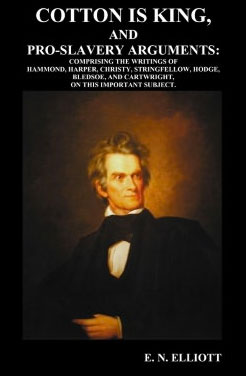 What intrigues me about this book on the open stacks is the history revealed in a note on the flyleaf. I have pasted below an extract from a handout I have given some of my classes, in order to illustrate that the practice of taking plunder in war is not limited to classical antiquity (my field).
What intrigues me about this book on the open stacks is the history revealed in a note on the flyleaf. I have pasted below an extract from a handout I have given some of my classes, in order to illustrate that the practice of taking plunder in war is not limited to classical antiquity (my field).
Spoils of War in the Stacks of the UPS Library
One of the most remarkable volumes in the UPS Library is the one whose title page appears to the right. It is a 900-page collection of pro-slavery treatises published in Georgia just before the Civil War. These treatises defend slavery on several grounds: economic, social, political, and religious — yes, religious, for two of these works exhaustively document the Biblical acceptance of the institution of slavery.
As valuable as this volume is for the historical importance of its content, there is something even more remarkable about it: the story of how it came to UPS. On the flyleaf is a penciled inscription: “Presented to Capt. E.Lewis Sturtevant, Co. G, 24th Maine Regt., upon compulsion, by Mrs. Wood, wife of Guerrilla Wood, Livingston Parish, La., May 13, 1863.”
It is hard to tell whether this is in the handwriting of Capt. Sturtevant or of Mrs. Wood. (A direct descendant of Sturtevant has compared this with his ancestor’s handwriting and is of the opinion that it is his.) In any case, the circumstances are clear. During the spring of 1863, Union forces under Nathaniel P. Banks were besieging Port Hudson, La., on the Mississippi, just north of Baton Rouge. (It fell at last on July 8, four days after the fall of Vicksburg. The Mississippi would then be entirely under Union control, and Lincoln would declare, “The Father of Waters again goes unvexed to the sea.”) In May and June, Livingston Parish, a few miles to the east of Port Hudson, was thick with Union troops preparing for the final assault.
These were the circumstances under which Capt. Sturtevant paid his visit to Mrs. Wood. Perhaps he was billeting his troops in her house. Evidently he caught sight of this fascinating book on her shelves and “liberated” it. Some years later (after he had become a famous expert on edible plants), he or his heirs donated the book to the Framingham, Mass., Town Library, as a sticker on the flyleaf notes. No doubt the library at some point discarded the book into a library sale, a sharp-eyed dealer picked it up., and it was eventually sold to a small Methodist college in the Pacific Northwest. It is on the open stacks, call no. E449 E48.
-by David Lupher
